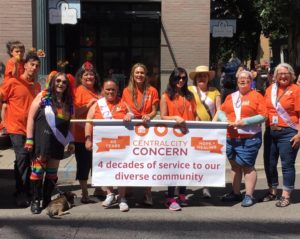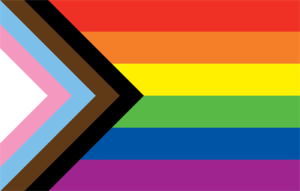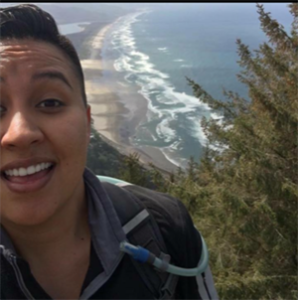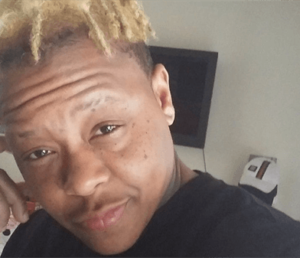This content block does not have a preview.
“We sit on the shoulders of Black and brown trans folks.”
— Adrian Martinez
LGBTQ Pride month takes place every June in commemoration of the 1969 Stonewall riots, an uprising led by trans people of color in New York City in response to violent repression and discrimination by the police against LGBTQ+ individuals. Today, cities across the U.S. celebrate this important moment in the fight for LGBTQ+ rights with pride parades, and Portland is no exception. The annual Portland Pride Parade brings nearly 50,000 people together in celebration, and Central City Concern has long been a proud participant.

The annual Portland Pride Parade is usually a joyous day for Central City Concern staff and clients alike, as seen in this photo from 2019.
Due to COVID-19, the 2020 Portland Pride Parade is moving online, and CCC is spending this month in mourning, reflection and action as our community protests against racism and police brutality while continuing to struggle with the ongoing effects of the pandemic.
People who identify as LGBTQ+, like many clients that CCC serves, are particularly vulnerable to the COVID-19 crisis. LGBTQ+ people are more likely to work in jobs that have been affected by the pandemic – food service, retail, hospitals and education. They are also more likely to live in poverty and to have less access to health care, resulting in disparities that are exacerbated by COVID-19. These disparities are compounded for LGBTQ+ people of color, whose lives and livelihoods are at especially high risk.

CCC had hoped to fly the intersectional pride flag at this month’s now-cancelled Pride Parade. The flag was created by Portland designer Daniel Quasar, who incorporated new elements representing the centering of Black, brown and transgender people in the LGBTQ+ community.
Nationally, LGBTQ+ people of color are more likely to have had their work hours cut during the pandemic, compared to white LGBTQ+ people and the general population – leaving them more economically vulnerable and fearful about the future than before.
Adrian Martinez, an equity and inclusion specialist at CCC, reflected on the Pride Parade tradition and the 1969 Stonewall uprising – and the leadership of Marsha P. Johnson and Sylvia Rivera, two heroes of that movement who were people of color and trans women. “We sit on the shoulders of Black and brown trans folks,” they said.

Adrian Martinez is an Equity and Inclusion Specialist in CCC’s Office of Equity and Inclusion. They know the fears that many people in the LGBTQ+ community have been facing, especially those living at the intersections of multiple marginalized identities.
Adrian is part of a 26-person LGBTQ+ workgroup at CCC, whose mission is to center the voices of the LGBTQ+ community within the organization. When the COVID-19 pandemic became a reality, Adrian said, the workgroup knew they had a role to play.
“In the beginning, it really was bringing back those feelings of, ‘We’ve been here before,’” Adrian said, describing conversations the workgroup had about the traumatic HIV epidemic of the 1980s. They knew it was important to advocate for the LGBTQ+ and Black, Indigenous and people of color LGBTQ+ communities at CCC as the organization’s response to COVID-19 developed.
“Folks in this group were thinking about, ‘How do we direct attention to the population that isn’t white, straight, cis?’” they said.
Like every team at CCC, the workgroup is still striving to understand the long-term impacts of COVID-19 – for LGBTQ+ people, and especially for those who are Black, Indigenous, people of color and transgender – and how CCC can meaningfully respond with care and compassion.

Tony McDade, a Black trans man, was killed last month by police in Tallahassee, Florida. His death is believed to be at least the 12th death by violence among transgender and gender non-conforming people this year in the US. “We have to recognize the intersections,” said Adrian Martinez.
“Nothing’s a single issue,” said Adrian.
Adrian does see a silver lining this month. The Virtual Pride events that will take the place of traditional Pride celebrations harken back to the ways that LGBTQ+ people connected “before it was okay to be gay or queer or out-loud or visible,” they said. Online forms of virtual connection that are now entering the mainstream have long been critical gathering places for marginalized communities.
“That’s where our community started,” they said. “Thank goodness for online places and safe spaces.”
Even though the Portland Pride Parade isn’t taking place in person this year, don’t miss out on the many events that have moved online. Click here to explore the Portland Virtual Pride Event Calendar.